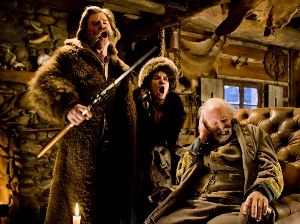[8]
Quentin Tarantino’s eighth film (because he’s counting) is a three-hour long claustrophobic western about eight characters holed up in a lodge during a snowstorm who all have reason to kill one another. Leading the ensemble cast are Kurt Russell as a bounty hunter, Jennifer Jason Leigh as his ruthless, almost feral captive, Samuel L. Jackson as a Union major delivering corpses for reward money, and Walton Goggins as a hick sheriff. Rounding out the cast of ne’er-do-wells is Tim Roth, Michael Madsen, Demian Bichir, and Bruce Dern. Zoe Bell and Channing Tatum also make appearances. The cast carry the movie well, and Tarantino keeps the film moving along with several twists, turns, revelations, and trademark viscera.
Is it too long? Probably. I could have done without a big chunk of the movie’s third act. Has Tarantino gone too far this time? In terms of his style, The Hateful Eight might be the most indulgent of all his films — especially considering the whole 70mm Roadshow release of a film that’s largely a filmed stage play in a single location. But in terms of content, I’m glad Tarantino is out there pushing boundaries. I can’t think of another film that gets at the heart of racism so directly and appallingly. When Bruce Dern, playing a racist old Confederate general, learns how his son died from Samuel L. Jackson, Tarantino is — for my money — explaining racism more succinctly than anyone has ever explained it in a movie before.
Ennio Morricone provides a wonderfully ominous score and Robert Richardson makes the most out of the early exterior scenes, which look even more magnificent in the extended aspect ratio of 2.76:1. I could have done without Tarantino’s narration, which doesn’t enter into the film until after the mid-point, and I also didn’t care for the abrupt music editing. But there’s still no question that Tarantino knows how to give audiences a good time, and The Hateful Eight does a great job transporting you to another time and place — I felt snowed in with these seedy characters. Let’s just hope the maestro’s ninth and tenth films can reign in that run time.
Academy Award: Best Original Score (Ennio Morricone)
Oscar Nominations: Best Supporting Actress (Jennifer Jason Leigh), Best Cinematography (Robert Richardson)

